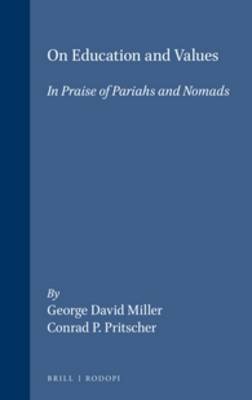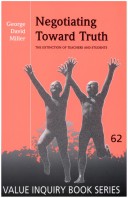Value Inquiry Book Series / Philosophy of Education
2 primary works
Book 34
The educationally emaciated, suffering from intellectual and spiritual bilumia, binge on facts and linear thinking. The imprimatur of clarity and the infatuation with quantification are accoutrements of this affliction, often characterized by apathy. Chaos is introduced as the wrecking ball for the hierarchical skyscrapers that overcrowd the educational skyline. The type of chaos proposed can be explained by the neutron bomb analogy. Chaos destroys all that is inessential but leaves standing the essential and promotes holistic rather than compartmentalized learning. The authors further contend that one insight is better than a myriad of facts; in being vigilant of serendipity; that the value-aspect of facts is as important as the facts themselves. Such beliefs form a foundation for educational holism. Our goal is to popularize philosophy in the same way science has become popular without a mass understanding. Empiricism is criticized for creating the theoretical basis for fragmentation (forming the basis for an island ideology) by excising essence. Founded on inessential empirical ideology, efforts to teach multiculturalism merely exacerbate difference, promote alienation, and discourage tolerance. Within the framework of value hierarchies we favor, tolerance is not understood as open-armed acceptance of just anything, but the forbearance of an evil for the promise of greater good. Essence cannot be removed: even in the idiosyncratic we can find the essential. In the absence of chaotic methodology, critical thinking remains an apolitical, amoral, and atemporal process displaced from social and political reality. We propose a critical thinking that is not legalistic, but is action-oriented. The pipe dream for education is a political, moral, temporal, and decompartmentalized critical thinking that disseminates philosophy across the curriculum. Those who risk becoming pariahs and nomads are essential to the rejuvenation of the educational system.
Book 62
For far too many people for far too many years, schooling has been a debilitating, demoralizing, and ultimately dehumanizing experience. Make-shift, half-hearted, and watered-down reform measures have proved ineffective. Reform throws out the bath water, but keeps the baby. Radicalism recognizes not a baby but a beast lurks in the bath water and throws both out. This dramatic redefinition of schooling examines four models of dynamism as provided by Nietzsche, Whitehead, Dewey, and Freire. Nietzsche's af-firmation of dynamism is marred by his elitism. Whitehead understands that inert cripple schooling. Without dialogue, ideas remain inert. Dewey misunderstands thinking and does not grasp its inherent double movement: toward order and disorder. Freire's pedagogy is transcended, with emphasis on negotiation between prime values. The final chapter expounds a radical pedagogy of dynamism. Miller argues that teaching and learning are not separate acts, but form a continuum. Within the teaching-learning continuum, all participants are spontaneous and receptive and seek to overcome fear of process, ambiguity, and doubt. The key to radical schooling is a pro-active stance toward creativity that allows for a dynamic integration of difference in dialogue. Negotiating Toward Truth is a call to arms for all educators. The book asks us to look closely what is in the bath water and to have the courage to throw the beast out with the bath water.

